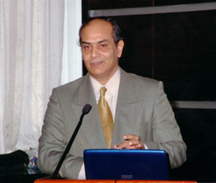|
| Ajai R. Singh M.D. |

|
| Shakuntala A. Singh Ph.D. |

|
A peep into man's histority: the lessons
for today
AJAI R. SINGH
KEM Hospital, Bombay
SHAKUNTALA A. SINGH
Joshi’s College
of Arts, Thane
1
' "The reason why I was born a jackal", says a character in the Mahabharata, "is that I was a counterfeit pundit, rationalist and critic
of the Vedas, being devoted to logic and the useless
science of reasoning, a proclaimer of logical arguments,
a talker in assemblies, a reviler and opposer of priests in arguments about Brahman, an unbeliever, a doubter of all, who thought myself a pundit".' (Radhakrishnan 1983; 484-5, wherein he quotes from the Mahabharata thus).
No. We shall not be led into justification or rebuttal of the stand-point that this quotation almost tempts us to launch into. For if, reason and logical arguments, coupled with opposition to priest-hood and the attendant dogma is
precisely what makes for philosophy for some (and also why the label philosophy
to whatever goes on in the name of Indian philosophy is suspect according
to them, since it often boils down to the authority of this or that preceptor)
it can be equally forcefully argued that what goes on in the name of the defense of reason and conceptual analysis is more
hair-splitting argumentation of aimless meanderings whose internal coherence and apparent consistency only camouflage the essential lack of inclination, or ability, in its professors to rise above their own encapsulated world-viewing. If the proper, or rather
only, concern of philosophy is to be the analysis of concepts, then it is analysis
which is supreme, and concepts qua concepts, their worth, their expanse, their intrinsic merit or otherwise become
secondary to its domain. Now of course it can serve the purposes of some to view
philosophy thus. But it serves their purpose, and the purposes of their
philosophizing. It is a moot point whether it serves the purpose of philosophy
itself.
Reason and its justification have worth only up to the limits of their own
expertise. Stretching it beyond this serves the
purpose neither of the understanding of concepts
nor their analyses. This indeed is what the above quotation can be said to mean when it talks of counterfeit pundits, of rationalists who criticize the Vedas and revile assemblies, unbelievers and doubters who oppose authority and seek thereby, albeit unconsciously, to
establish their own. And now if we deem it worthwhile
to re-read the above quotation it may not appear
as shocking and sacrilegious to our modernist sensibilities as it seemed. For it anticipates the way arguments about Indian philosophy, or for
24 AJAI
R. SINGH AND SHAKUNTALA A. SINGH
that matter about Indian thought itself, has bared of its psyche over the last few years to those who must both study and guide it, either on a course of
pluralistic heterogeneity or seek to extract a homogeneous substratum and reject all the residue. This is the essence of the
Karl Potter-Daya Krishna controversy (Daya Krishna
1984, Karl Potter 1985), for example; but it only reflects a wider difficulty with the systematization of Indian thought that
has stumped most reasoned analyses. For it seeks thereby to stretch the limits of reason itself, probably considering it limitless; and unable to see therein the relevance, and irrelevance, of varied viewpoints, whether of
our rationalities or our beliefs. And it is not reason, neither is it cognition, nor faith, nor even a judicious amalgam of
all these that can serve as a master-tool. Simply because there is no master-tool, here as anywhere else. There are only reference-points, intersecting issues, and relevant or irrelevant departures. This need
apply to all enterprises of man, whether his forays
in the fields of the natural and physical sciences,
the social sciences, or the humanities. His philosophy is no less immune to this generalization. Philosophy, rather, should project this cognition in its utmost brilliance, and not straitjacket itself in adventitious
barricades of simulated orderliness. Lack of order
is not necessarily disorder, nor is presence of order a guaranteed
protector against disorder. Lack of order is often necessary to the vitality of thought,
and when order is only the second name for regimentation of thought, is the sign
of a philosopher's personal search for order in the midst of a plethora of anarchical
mushroom-ings that bombard his sensibilities and make him react to them with the weapon
he has honed to perfection, his reasoning. But to realise that the weapon is good
and efficient only up to a limit is probably the first important landmark in
the philosopher's respect for man's cognitive enterprise and genius. And probably
also just compensation he must repay to the branch that has offered him so much.
It is not a compensation, really. It is only a repayment that must ensure a fresh loan to launch a more robust
enterprise of enquiry on.
Suffice it for the present, for this is a topic by itself and indeed much
can be said for either side, whatever one's personal
inclinations or likings. We only need to keep
at the fore-front of our consciousness that we do not hoist our personal needs and likings on to our philosophizing; personal
needs and likings, mind you, not personal cognitions. For cognitions cannot but
be hoisted. In fact what are we doing but
that? And needs have two aspects, one, creative and positive, the second,
alienative and negative (Chattopadhyaya 1987; 2). While the former needs to be forwarded,
the latter which often impin -ges on and obstructs its genuine articulation, has
to be assiduously guarded against. We realize you may be itching to point out holes in this argument. We shall discuss the further ramifications of this in the last section. Preserve it till then, if preserve it you must.
But, then, let us come back to the quotation with which we started. We Indians are a funny people. We have been big-talkers, often
boasters of empty
A PEEP INTO MAN'S HISTORITY 25
slogans of a glorious past, of religion and of ethics, ever ready to offer advice, hair-splitters and hypocrites, sycophantic pen pushers and avaricious god-men. And yet we are also one amongst the few great ancient cultures
to have survived, whatever that may mean. There is also no doubt that for most skeptics and India-baiters of yester-years, its attraction is its incredible disparity, its chaotic responses, its two-faced outlook to faith and finance
whose tangles one finds in every sphere of Indian
life. This is also the India to which they come
back, again and again, from which they can never totally alienate themselves even if they are never able to identify with it consciously. Perhaps in this lie shades of their racial unconscious.
Reason and criticism have always been looked down upon in the true-bred Indian Brahmanic tradition. It upholds the testimony of one
or the other authority, whether the Vedas, dharma
(moral order), or the ruler. The reasons for this
may not be far to seek. In a cultural milieu that must breed and encourage conformity, sycophancy and loyalty are prized qualities as much as dissent, criticism and the will to differ
become dangerous and subversive. Again, when the
wish to uphold order, any order (disorder included) against lack of order is accorded primacy, there cannot but result opposition to radical change, and to such questioning of authority as appears to undermine its power. This
means to uphold rule, even if despotic, against anarchy, even if promising of reform.
But such reasons and answer seeking appear correct only when one turns a blind eye
to the lessons of History. Their superficiality becomes apparent immediately on any serious discussion of the subject. Let
us see how.
II
(Contd.)
<<<Previous
Next>>>
|

